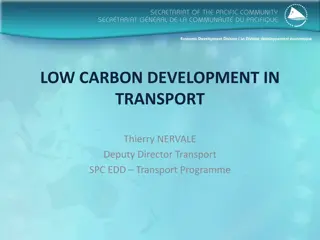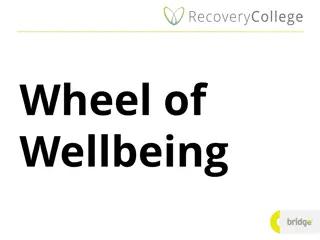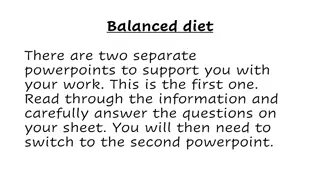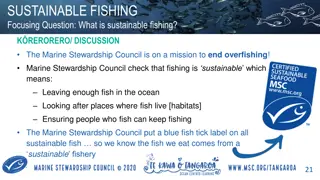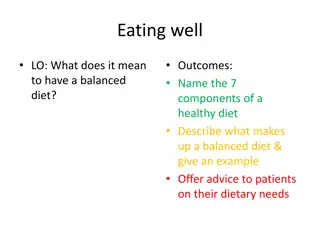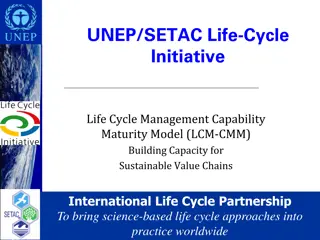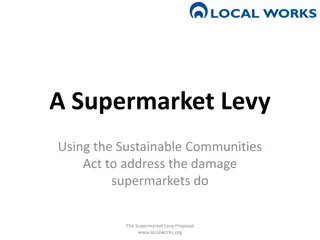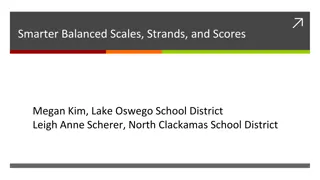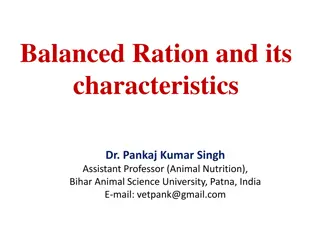Sustainable Work Practices for a Balanced Life
Promoting sustainable work practices is essential for individuals to maintain a healthy work-life balance throughout their career. Key aspects include age-friendly work environments, job quality policies, and addressing various challenges faced by workers across different age groups. Ensuring job quality, inclusivity, and reconciliation between work and personal life are crucial for sustainable work over the long term.
Download Presentation

Please find below an Image/Link to download the presentation.
The content on the website is provided AS IS for your information and personal use only. It may not be sold, licensed, or shared on other websites without obtaining consent from the author.If you encounter any issues during the download, it is possible that the publisher has removed the file from their server.
You are allowed to download the files provided on this website for personal or commercial use, subject to the condition that they are used lawfully. All files are the property of their respective owners.
The content on the website is provided AS IS for your information and personal use only. It may not be sold, licensed, or shared on other websites without obtaining consent from the author.
E N D
Presentation Transcript
Combining work with non-working life Sustainable work over the life course Greet Vermeylen Senior Programme Manager 1
Work and working life Sustainability of work Ageing workforce: workers of all ages Work and health Workers with health issues Reconciliation: work and private life Work-life balance and gender equality
Sustainable work over life course To ensure more people can participate in the labour market and are able and willing to do so until a later age Conditions enable a fit between work and the circumstances of the individual throughout their working life
Job quality and sustainable work Policies, regulation, practices Companies Public policies Social partners Good working conditions and job quality are instrumental to being able to continue working over the life course Job Quality Job Taking care of circumstances and situations of workers throughout working life Ensure that workers can keep on working through the life course : Adapt work to health issues and situation Worker Inclusion policies - Workers of different age - health issues - care responsibilities Workplace practices allowing for better reconciliation between work and private life throughout the life course, leave arrangements and care infrastructure 4 Source: Eurofound (2015) Sustainable work: concept paper
Age, work and sustainable work Differences in working conditions of workers by age Young workers exposed more to certain working conditions Risks spread over working life - nightwork, shiftwork, intensity Older workers less access to training, career prospects, learning 73% of workers report being able to do the job until 60 Men more than women 1 in 5 wants to work as long as possible Skills and discretion Social environment Sustainable work associated with Physical environment All job quality indices (Except earnings) Work intensity (reversed) Prospects Working time quality Earnings Source: 6EWCS
Considerable country differences Source: SMT, 6EWCS
Job quality and health One in three report backache, MSDs, fatigue Integration of workers with chronic illness One in four says work affects their health negatively 6 % at risk of mental well-being problems Difficulty falling asleep Waking up during sleep Muscular pains Waking up exhausted Backache Headache Fatigue Skills and discretion Social environment Physical environment Work intensity (reversed) Prospects Working time quality Earnings Source: 6EWCS
Reconciliation work and private life Work-life balance associated negatively with long, irregular, asocial hours.. associated positively with shorter hours, autonomy.. 19% report poor work-life balance more men than women - women do more unpaid work most intensive time when children Positive Negative Keep on worrying about work Too tired after work for household jobs Family affects job time Work life balance Skills and discretion Social environment Physical environment Work intensity (reversed) Prospects Working time quality Earnings Source: 6EWCS
Unpaid work unevenly distributed 38 8 Single, 45 and under, no children 34 10 40 5 Couple without children, woman aged 45 and under 36 12 41 20 Couple with youngest child under 7 32 39 42 16 Couple with youngest child 7 12 32 36 41 9 Couple with youngest child 12 and over 33 24 40 5 Couple without children, woman aged 46 59 33 15 31 6 Couple without children, both 60 and over 27 17 36 9 Single, 50 and over, without children 32 12 39 10 EU28 33 22 Source: 6EWCS
A final reflection Circumstances of individual needs to be taken into account to ensure workers can engage in work over the life course No one fits all solution for all workers and situations Transitions over the life course are important All actors have role to play: governments, social partners, companies Job quality associated with sustainability of work and reconciliation of work and private life 10
Thank you www.eurofound.europa.eu
Inclusive labour market 1 in 5 has long-standing illness Increases with age Half have limitations in daily activities Workplaces adapted for up to 29% One in four would need more changes Workplaces more inclusive





